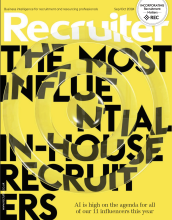NEW TO THE MARKET: 28 APRIL-2 MAY 2025
• Jobmatch Sweden, a leader in occupational psychological testing, is expanding in Norway through a new partnership with consulting firm Sund Raad. Sund Raad, which focuses on enhancing employee engagement for small and medium-sized businesses, will integrate Jobmatch’s DNV-certified Talent test into its services. This marks Jobmatch’s second partnership in Norway, following its 2022 collaboration with Hapro Jobb og Karriere. Jobmatch Talent is a scientifically validated tool used for recruitment and employee development, according to the company press release.
• STEM recruitment specialist Matchtech has launched STEM Futures, a free, on-demand employability platform aimed at helping young people break into engineering and technology careers. The programme includes expert-led sessions on job search strategies, CV writing, interviews and personal development, and is part of Matchtech’s broader initiative to address the STEM skills gap and support emerging talent.
In addition, Matchtech has awarded the first two grants from its Materna Fund, a £2.5k bursary created to support engineering students facing financial hardship. The inaugural recipients, Sergio Carreno Vargas and David Sarembock from the University of Portsmouth, are using the funds to focus on their studies and development without the added pressure of financial strain.
• Meet Life Sciences has launched Synergy, a new standalone service designed to tackle people capability challenges in the life sciences sector that go beyond recruitment. As part of Meet’s evolution into a full-service talent solutions partner, Synergy offers tailored support in areas like workforce planning, leadership development, skills mapping, culture embedding and organisational design. Led by vice-president Kirsty Wilson, the service is built specifically for the life sciences industry and is focused on delivering measurable, outcome-driven solutions. Unlike traditional consulting, Synergy provides hands-on support from design through to implementation, helping clients build the capability needed to grow, adapt and lead in a competitive global market.
• Right Management, part of ManpowerGroup, has launched a refreshed brand strategy called ‘The Right Way’. It’s a human-centred, data-backed framework that aligns workforce development with business strategy. The new identity centres on ‘The Right Way loop’, a distinctive visual element with modern colours and typography that will be used across all brand touchpoints.








